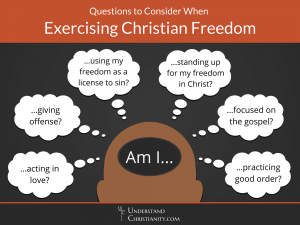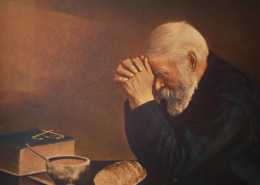In the Old Testament, God gave his people very specific laws and regulations to guide them in their living. He gave them laws concerning dietary restrictions, procedures for dealing with infectious diseases and even mildew, rules for farming, for a Sabbath day, how to punish specific crimes, and how to conduct international relations. He gave them specific instructions on how they were to worship him, what sacrifices to bring at different occasions, how the priest was to handle the sacrifice, and even what to do with the ashes from a sacrifice. All of these laws were meant to keep Israel together as a nation and point ahead to the coming Savior.
Roughly 2,000 years ago, that Savior came and fulfilled God’s law for all people (see Forgiveness of Sins for All People and Justified by Grace through Faith). All of those laws meant to keep Israel together as a nation were not binding on God’s people anymore (see Acts 15, Galatians 5:1, and Colossians 2:16-17). They no longer had any specific restrictions for living and regulations for worship. They could live and worship in any God-pleasing way they wanted (see Worship). That is what we call Christian freedom. Thanks to Christ fulfilling God’s law for everyone, Christians have the freedom to use their sanctified judgment in deciding the wisest course of action for things neither commanded nor forbidden by God.
Adiaphora
Things that are neither commanded nor forbidden by God are called adiaphora, or matters of “indifference.” These matters do not affect our standing with God. God is not going to be more pleased with one way a Christian handles adiaphora more than another. We have been given the freedom to choose in these matters. However, Christians can still misuse their Christian freedom. Therefore, God shows us in Scripture that Christian freedom is not so much a matter of having the right to choose as it is being willing to give up that right for the sake of the gospel and the sake of others.
“You, my brothers and sisters, were called to be free. But do not use your freedom to indulge the flesh; rather, serve one another humbly in love.”
Galatians 5:13
It is good to be clear about what matters do not fall under adiaphora. There is a portion of God’s law that addresses moral issues, called the moral law. These are things God has told us are in general either good or evil. For example, honoring your parents is a God-pleasing thing to do, while murdering another person is a sin. No one has the right to choose in matters like these, and God is very clear in his Word about what is God-pleasing and what is sinful. Also, Christian doctrine, or Christian teachings, are not a matter of Christian freedom. Christians must never choose what doctrine they like best but must always follow what God has taught them in his Word for their teachings (Isaiah 8:20; Galatians 1:6-9). God has not given us the right to choose in matters of moral conduct and Christian doctrine.
Freedom is not a License to Sin
In matters where we do have the right to choose, God has given us some guidelines so we can make wise decisions as we exercise our Christian freedom. First, Christians are never to use their Christian freedom as a license to sin (Galatians 5:13; Romans 6:1-14; 2 Peter 2:20-21). Yes, Christ paid for our sins, but Christians thinking that gives them the right to sin is not showing love for Christ who paid for their sin. Christians still delight in God’s moral law and use it daily to crucify the desires of their sinful natures (Romans 7:22; Galatians 5:16-18; also Psalm 119). Also, as Christians live freely for God they will not allow themselves to “be mastered by anything” (1 Corinthians 6:12). This means they are not to fall into anything that is harmful to themselves, such as sexual immorality (1 Corinthians 6:13-20) or addiction. For example, being able to eat and to work is good, but indulging in food or working long hours to the point where either it is harmful to you or to your family physically or spiritually is an abuse of Christian freedom.
Giving Offense
Christians will also be careful not to give offense. Giving offense is causing someone to stumble in their faith or to lose their faith. This can be teaching false doctrine, which leads people away from the truth in God’s Word (1 Timothy 4:16, 6:20-21). It can also be sinful living, which encourages other Christians to sin in the same way and be led astray (Matthew 18:6-9). But it can also mean leading a weak Christian to do something against their conscience. Even if someone does something that is not a sin but they believe it is a sin, they are willfully doing something they think is against God’s will and are therefore sinning.
The apostle Paul explains giving offense in his first letter to the Corinthians. He uses the example of meat that had been sacrificed to idols, which was a common pagan practice in that time. While the meat was ultimately God’s and eating the meat was not wrong in itself for a Christian, if a weaker Christian saw a stronger Christian eating the meat, they might not yet understand they had the freedom to do so and thus think poorly of the stronger Christian. In this case, Paul says, “If what I eat causes my brother or sister to fall into sin, I will never eat meat again, so that I will not cause them to fall” (1 Corinthians 8:13). Since weak Christians still need time to understand their liberty in Christ, stronger Christians will be patient with weaker Christians as they grow in their faith and in their knowledge of Scripture (1 Corinthians 10:32). Stronger Christians will do this even if it means they have to give up their rights for the sake of others. “So whether you eat or drink or whatever you do, do it all for the glory of God” (1 Corinthians 10:31).
“Do Everything in Love”
“Be careful, however, that the exercise of your rights does not become a stumbling block to the weak.”
1 Corinthians 8:9
Paul gives Christians an overarching guideline as we glorify God with our lives: “Do everything in love” (1 Corinthians 16:14). It is love for God and love for others that leads a Christian to bear with a weaker Christian brother or sister in every situation. Fellow Christians will be helpful and supportive of each other and will not look down on and judge each other (Romans 14:10-13). A strong Christian will not think lesser of a weaker Christian, and a weaker Christian will not denounce a stronger Christian as a sinner. Judging hearts is for God to do, not for us to do (1 Corinthians 4:5; James 4:12). Even as Christians admonish someone for false doctrine or practice they do so out of love. This love will also bring Christians together and promote peace, which means someone might have to give up promoting their own view if it might cause a division within his or her church. God wants Christians to show love as they work toward unity and work to build each other up in the gospel (Romans 14:19).
Good Order
Another important principle Christians will exercise as they build each other up in the gospel is good order. Having good order within a congregation or a larger church body will help avoid confusion in church matters and is good for the sake of all. The Corinthian congregation in Paul’s time had some issues with their worship gatherings being confusing for outsiders and not enriching for the believers who would gather there. Paul told them, “Everything should be done in a fitting and orderly way” (1 Corinthians 14:40). Practicing good order is helpful for making the gospel easy to understand and easy to share. “For God is not a God of disorder but of peace” (1 Corinthians 14:33). Therefore, as Christians live and share the gospel in this world, they will follow the example of God and conduct themselves and church matters in an orderly manner.
Focused on the Gospel
As Christians follow a spirit of love, work to give glory to God, and do so in an orderly way, they will always focus their efforts on the gospel. The purpose of this life is to share the message of Christ crucified with the world, and therefore as Christians utilize their freedom in Christ they will be sure not to put any obstacle in the way of sharing the gospel. For the apostle Paul, when he was spending time with Jews he would live like a Jew. When he was spending time with the non-Jews he would live like a non-Jew. When he was with weaker Christians he lived as a weaker Christian so as not to give offense. “I have become all things to all people so that by all possible means I might save some. I do all this for the sake of the gospel, that I may share in its blessings” (1 Corinthians 9:22-23). As long as it is wise, useful, not a sin, and does not hurt or hamper others in their faith, Christians will exercise their freedom in a way that will “win as many as possible” (1 Corinthians 9:19) for God.
Standing Up for Your Freedom
“It is for freedom that Christ has set us free. Stand firm, then, and do not let yourselves be burdened again by a yoke of slavery.”
Galatians 5:1
In fact, Christians can uphold the pure gospel by clinging to the freedom Christ has given them. Paul had to do so on his missionary journeys (see Paul’s First and Second Missionary Journeys and Paul’s Third Missionary Journey) as he chose others to travel with him. When Paul took Timothy with him, he had him circumcised (circumcision was commanded in God’s Old Testament law) so he wouldn’t be a stumbling block to the Jews he was trying to reach. However, when some Jews were trying to tell Paul that his other traveling companion, Titus, had to be circumcised in order to be truly one of God’s people, Paul was forced to refuse because such a notion would have contradicted the gospel message, that Christ fulfilled the Old Testament law for us. As Paul said to the Galatians: “It is for freedom that Christ has set us free. Stand firm, then, and do not let yourselves be burdened again by a yoke of slavery” (Galatians 5:1). Christ already took that yoke upon himself and fulfilled the work for us, and so when someone tries to force us under man-made laws or false doctrines, we cannot give in and must cling to our freedom because the gospel is at stake.
Christ has indeed set us free. Now we can live for God and spread his gospel message in any God-pleasing way we choose. However, as free Christians driven by love for God and for others, we also know the importance of being able to recognize when it is wise to give up our right to choose. In every situation, we will seek to glorify God and his gospel message so others can enjoy the freedom Christ has won for all of us and someday share in the freedom and the joy of eternal life.






